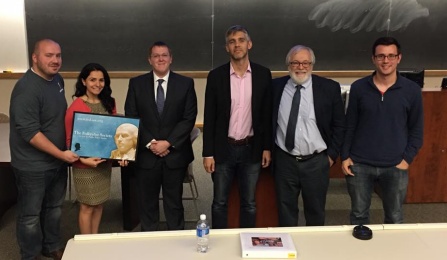Law Links - November 2016
Exploring the tension between free speech and hurt feelings

Jason Michael Gunning, Diane Ita, Alex Fehrman, Professor Matt Steilen, guest speaker Professor Richard Duncan, and Joshua David. Photo credit: student chapter of the Federalist Society.
Great universities value free expression. They also value civil discourse.
Those values, and the tension between them, were the focus as UB School of Law’s student chapter of the Federalist Society hosted an outspoken scholar who addressed “Free Speech on Campus: Remember When the University Was a Marketplace of Ideas?”
The Oct. 19 event brought to O’Brian Hall a University of Nebraska College of Law professor, Richard Duncan, who perceives a “censorship culture” at many American universities.
In many ways, Duncan said, universities reflect a broader American tension over speech that many find offensive. Support is wavering, he said, for the First Amendment’s guarantee of freedom of speech: “The strongest supporters of free speech are the oldest demographic, but 40 percent of millennials say that government should be able to prevent people from saying things that would offend minority groups.”
Duncan cited a litany of examples, from some of the best-regarded schools in the United States, of policies that he said have a chilling effect on the free expression of ideas. For one, he pointed to the University of California’s recommendation that faculty avoid using terminology that could be understood as “microaggressions.” That, he said, would include such statements as “There is only one race – the human race”; “I believe the most qualified person should get the job”; “America is a land of opportunity”; “Everyone can succeed in this society if they work hard enough”; and “Affirmative action is racist.”
The university’s policy, he noted, is only a recommendation. “But if you’re a young professor or a graduate assistant, you may well self-censor to stay out of trouble with the powers that be,” Duncan said. “The result is that only one side of the issue can be expressed openly in the classroom. This is indoctrination, not education.” He detailed several other instances of “free speech under attack,” saying, “Every day there’s another case of censorship on campus.”
Duncan also proposed a handful of reforms. Among them, he suggested that schools teach the value of free speech along with multiculturalism and diversity; appoint a vice chancellor for free speech and religious liberty, “someone whose job it is to promote free speech”; and require incoming students to take a course in free speech.
Associate Professor Matthew Steilen, who was invited to act as a respondent, noted that the proposition that the First Amendment creates a “marketplace of ideas” is not the original conception, but rather a 20th century judicial invention by U.S. Supreme Justice Oliver Wendell Holmes. Originally, he said, universities were “in service of preparing religious and government leaders. Because they had that mission, they tended to control much more invasively the conduct and speech of people on campus.
“You have to be clear about what a university is trying to do,” Steilen said. “As Robert Post has argued, the principal aim of universities is to produce knowledge. A marketplace of ideas doesn’t produce knowledge. What produces knowledge is disciplines.” For example, he said, in a university history department, “There is a methodology of doing good history, and that constrains speech. We know that the best way to produce knowledge is not to say whatever comes to your mind, but to constrain speech in a way that produces truth.”
The question for free speech, he said, is what speech enhances that goal and what speech undermines it?
From that perspective, Steilen said, “speech that is fundamentally inconsistent with the equal participation of people in the knowledge-finding process is out of line. Speech that has no role or value in either the production of knowledge or the formation of a community that sustains the production of knowledge need not be protected as a constitutional protection. Because the university is not just an open playing field – it’s a special institution.”